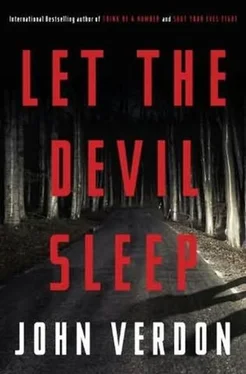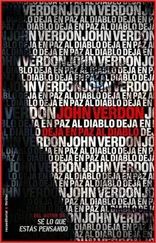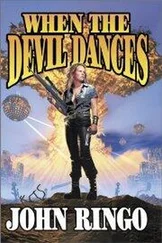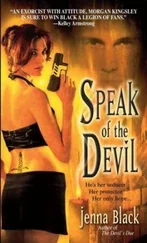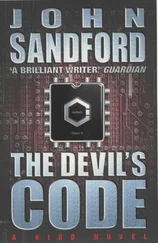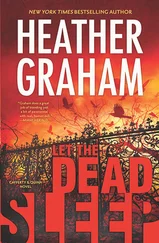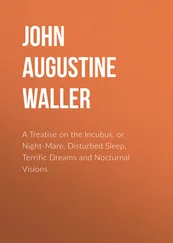He took a deep breath, as if to settle his nerves before announcing, as the camera zoomed in on him, “It’s time now for some important messages…”
Gurney grabbed the computer mouse and slid the volume icon to zero, a reflexive response to commercials.
Madeleine looked at him sideways. “We haven’t even seen Kim come on yet, and I’m already losing my patience with this.”
“Me, too,” said Gurney, “but I need to at least watch Kim’s interview with Ruth Blum.”
“I know,” said Madeleine. She gave a small smile.
“What is it?”
“There’s a silly irony in this whole situation. When you were injured, when the aftereffects didn’t disappear as quickly as you might have liked, you sank into a hole. The deeper you sank, the less you did. The less you did, the deeper you sank. It was painful to see you like that. Doing nothing was killing you. Now all the craziness that’s going on, all the danger, is bringing you back to life. You used to sit at the breakfast table on a gorgeous morning, running your finger up and down your arm, checking the numb spot, checking to see if it had changed, if it had gotten worse. You know what? You haven’t done that all week.”
He didn’t know what to say, so he said nothing.
On the screen the last in the series of commercials faded to black and the scene switched back to the interview table.
Gurney slid the volume icon up in time to hear the host ask a question of the other guest at the interview table.
“Dr. Monty Cockrell, so good to have you with us as well. America knows you as an expert on rage. Tell us, Doctor, what was the Good Shepherd murder spree really about?”
Cockrell paused dramatically before answering. “Quite simply-war. The shootings and the manifesto explaining them were an attempt to initiate class warfare. It was a delusional attempt to punish the successful for the failings of the unsuccessful.”
With that the host and his two guests launched into a freewheeling discussion that lasted for five full minutes-a lifetime in television-and left all three men agreeing that the right to bear arms was, at times, the only defense against such poisonous thinking.
Gurney lowered the volume again and turned to Madeleine.
“What?” she asked. “I can see your wheels turning.”
“I was thinking about what the little Indian guy said.”
“That your killer would be watching this moronic program?”
“Yes.”
“Why would he bother?”
It was a rhetorical question, to which Gurney didn’t respond.
It took several more minutes of painful viewing before Kim’s interview with Ruth Blum finally came on. The two women were sitting across from each other at an outdoor table on the rear deck of a house. It was a sunny day. They were both wearing lightweight zippered jackets.
Ruth Blum was a plump, middle-aged woman whose facial features appeared weighed down by sadness. Her hairdo struck Gurney as touchingly silly-a tousled little pile of golden-brown curls that resembled a Yorkshire terrier perched on her head.
“He was the best man in all the world.” Ruth Blum paused, as if to give Kim time to appreciate this great truth before continuing. “Warmhearted, kind, and… always trying to do better, always trying to improve himself. Did you ever notice how the best people in the world always try to do better? That was Harold.”
Kim’s voice was shaky. “Losing him must have been the worst thing that ever happened to you.”
“My doctor told me I should take an antidepressant. An antidepressant ,” she repeated, as though it had been the single most inconsiderate piece of advice she’d ever received.
“Has anything changed with the passing of time?”
“Yes and no. I still cry.”
“But you continue to live.”
“Yes.”
“Do you know anything about life now that you didn’t know before your husband was killed?”
“I know how temporary everything is. I used to think that I’d always have what I had, that I’d always have Harold, that I’d never lose anything that mattered. Stupid to think that, but I did. The truth is, if we live long enough, we lose everything, everybody.”
Kim took a handkerchief out of her jacket pocket and wiped her eyes. “How did you two meet?”
“We met at a school dance.” During the next few minutes, Ruth Blum recounted the emotional highlights of her relationship with Harold, eventually circling back to her theme of a gift given and a gift taken away. “We thought it would last forever. But nothing does, does it?”
“How did you get through it?”
“The main thing was the others.”
“The others?”
“The support we were able to give each other. We’d each lost a loved one the same way. We had that in common.”
“You formed a support group?”
“For a while we were like family. Closer than some families. Everybody was different, but we had that one strong bond. I remember Paul, the accountant, so quiet, hardly ever said anything. Roberta, the tough one, tougher than any man. Dr. Sterne, he was the voice of reason, the one who had a way of calming people down. There was the young man who wanted to open a fancy restaurant. And who else? Oh, Lord, Jimi. How could I ever forget Jimi? Jimi Brewster hated everyone and everything. I often wonder what happened to him.”
“I found him,” said Kim, “and he agreed to speak to me. He’s going to be part of this.”
“Good for him. Poor Jimi. So much anger . You know what they say about people who are that angry?”
“What?”
“That they’re angry at themselves.”
Kim let a long silence pass before asking, “How about you, Ruth? Aren’t you angry about what happened?”
“Sometimes. Mostly I’m sad. Mostly…” Tears started coming down her cheeks.
The video interview segment faded to black, and then the scene cut back to the studio, to a shot of the host at the table with Kim. Gurney assumed that this was the interview segment she’d gone to the city that day to record.
“I don’t know what to say,” said the host. “I’m speechless, Kim. That was so powerful.”
She looked down at the table with an embarrassed smile. “So powerful,” he repeated. “I want to talk more about that in just a minute, Kim, but first I want to ask you something.”
He leaned in her direction, lowering his voice in an imitation of confidentiality. “Is it true that you’ve gotten a highly decorated homicide detective involved in this documentary project? Dave Gurney. The man New York magazine once called ‘Supercop’?”
A gunshot couldn’t have grabbed Gurney’s attention more completely. He studied Kim’s face on the screen. She looked startled.
“Sort of,” she said after a pause. “I mean, he’s been advising me on some issues surrounding the case.”
“ Issues? Can you give us any details?”
Kim’s hesitation convinced Gurney that she’d truly been caught off guard. “Odd things have been happening, things I’d rather not reveal yet. But it looks as if someone might be trying to stop The Orphans of Murder from being shown.”
The host affected intense concern. “Go on…”
“Well… things have happened to us, things that could be interpreted as warnings to back off, to stay away from the Good Shepherd case.”
“And does your detective adviser have any theories?”
“He seems to have a view of the case that’s different from everyone else’s.”
The host seemed riveted. “Are you saying that your police expert thinks the FBI has been on the wrong track all these years?”
“You’ll have to ask him that yourself. I’ve already said too much.”
Goddamn right , thought Gurney.
Читать дальше
